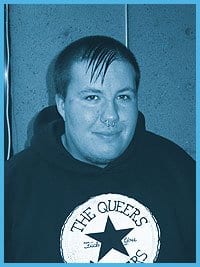Last spring I was contacted by a woman from CBC who was interested in interviewing me for the newsmagazine The Fifth Estate. I was pretty cautious. I’d been approached before by people who knew nothing about transgenderism and transsexuality, or who already held negative views about trans people. This one seemed different. But after seeing the result, Becoming Ayden, which aired Oct 13, I realized I was wrong.
The dyke producer told me she had noticed that trans people were becoming increasingly visible in the community and in the mass media. Demonstrating a good knowledge of trans issues, she acknowledged that gender identity clinics such as the Centre For Addiction And Mental Health were doing more damage than good. I agreed to be on the show and suggested my friend Ayden as another person to talk to. Ayden was 17 years old and at that time hadn’t started hormones yet.
The CBC crew started filming us at Pride this past June and for the next three months followed Ayden and I around, including a trip to Seattle for a Female-To-Male (FTM) conference.
Host/reporter Hana Gartner also interviewed us separately. Though I thought it went well, she did seem to think that Ayden was too young to be going on hormones. I said he was smart enough to be able to make his own decisions about his body.
The first time I started to become suspicious was in Seattle. After an interview with Gartner, Ayden came back to our hotel room upset. He told us that Gartner had asked him about his psychiatric history, which made him uncomfortable. He said that although he had already answered her question, she continued to press; he walked away from the interview.
After Seattle there was little contact with the CBC. Though we had been told that we could sit in on the editing, we were never informed of when the editing would take place. The copies of the raw footage we had been promised also never arrived.
The night the show aired, I sat at home with my boyfriend, while Ayden watched at his place. As the show started it became apparent that it was going to focus primarily on Ayden – a surprise to us. They also kept using Ayden’s birth name throughout the segment and referred to him as “she” for the entire show. Ayden was the only trans person in the show who was referred to by anything other than his chosen and correct pronoun – a blatant case of ageism.
The show focussed on medical transition, and argued the point that Ayden was too young to choose to be on hormones. They edited the piece so that he was shown twice walking off camera, refusing to continue the interview, even though, in my opinion, he was hounded by adults who were not respecting his choice to not answer certain questions. Quotes were chosen that made him seem like he had been dishonest with his doctor. I felt they were trying to make him seem mentally unstable.
This central focus on Ayden refusing to talk about these very personal things made Ayden seem like an out of control teenager. Far from the truth I know of Ayden, who has lived on his own for years and held a full-time job working for a social justice program and who spends all his spare time working as an activist.
By the show’s end, both Ayden and I were outraged. The message to us was that young trans people are not able to make choices about their own identities and physical transitions. They even discredited the sex reassignment surgeon they interviewed, playing clips of him questioning whether or not he’s doing the right thing.
To me, the show gave viewers a negative view of trans people and their choices. I’m even more concerned about the negative consequences this show may have had on trans-questioning youth who watched it.
Had we known that this was what the producers would air, I’m sure that we could have done things differently. Like not allowing them to film us at Pride where we donned playful gender-confusing clothing like skirts with ties. Like not allowing them to film us in the first place.
Though disappointed, I do see some positive aspect of the experience. Letters from all over Canada and the US have poured in from people angry about the show. People on the street have stopped me to tell me how upset they were over how we were treated. In my tutorial for a women’s studies class at U of T, the teacher dedicated half an hour to debriefing what went wrong with the documentary.
What started out as something horribly upsetting has ended up as a complete blessing. Sometimes being trans is a very lonely and isolating place. Sometimes it feels like the world is against me, and that no amount of activism can ever change people’s perceptions of gender. But through this ordeal with the CBC, I have learned that it can change, and it has. There’s a huge community of trans people and supporters out there, and they are not afraid to raise their voices and be heard.

 Why you can trust Xtra
Why you can trust Xtra


